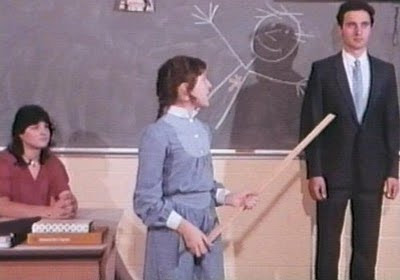 |
| Ed Wood (top row, center) stars in Glen or Glenda, as released by Admit One Video Presentations. |
Last week, we got to know Admit One Video Presentations, the offbeat Toronto-based company that distributed Ed Wood's movies in Canada in the 1980s. Like numerous other companies from that era, Admit One acquired vintage low-budget sci-fi and horror films and released them profitably for home viewing, much to the delight of the emerging "bad movie" cult. You might think of them as Canada's answer to Rhino Home Video or Something Weird Video. To my knowledge, Admit One put out their own versions of all six of Ed Wood's directorial efforts from Glen or Glenda (1953) to The Sinister Urge (1960). If eBay listings are to be believed, these releases are now pricey collector's items.
I was unaware of Admit One until recently, when reader Brandon Sibley brought the company and its products to my attention. To me, the most intriguing of the company's tapes is their release of Glen or Glenda because it gives us yet another slightly different cut of the film. In the past, I've explained how Glenda was released under numerous titles and was edited to various lengths, often to appease the censors. To summarize, the main edits I'm familiar with are:
- The Rhino cut. The longest, least-censored edit I've seen, if not necessarily the best looking or sounding. It was released on VHS tape by Rhino Home Video and was included on the two-disc set Ed Wood: A Salute to Incompetence (2007) from Passport International Entertainment. The film's title card is obviously, clumsily doctored. Whatever real title appeared onscreen has been blurred out, and the title "GLEN OR GLENDA" has been pasted over it. I believe this change was made by distributor Wade Williams, who did something similar to Night of the Ghouls (1959) aka Revenge of the Dead.
- The Image Entertainment cut. The most common version I've seen on the market. This is a sharper, cleaner transfer of the film with less static on the audio track, but it's plagued by numerous omissions, including a scene in which a homosexual man (Bruce Spencer) hits on an unfriendly straight man (Conrad Brooks). The dialogue also deletes certain references to God and sex. Some shots, including part of Glen's nightmare, have been trimmed for pacing reasons. Image's cut is the one used for the colorized version of Glen or Glenda and was also the one Rob Craig consulted for Ed Wood, Mad Genius (2009). It, too, has the doctored title card.
- The AGFA cut. The most recent edition of the film and the one that has provoked the most angry reactions from Ed Wood fans. This transfer from the American Genre Film Archive features dramatically brighter, crisper images than we've ever seen before, but it is also easily the shortest, most censored cut of the movie on the market. It's missing many sequences, some of which are iconic and crucial (e.g. the buffalo stampede) and also reorders certain scenes, especially during Glen's nightmare. The film features a unique credit sequence, including a title card that incorrectly identifies the movie as Twisted Lives.




